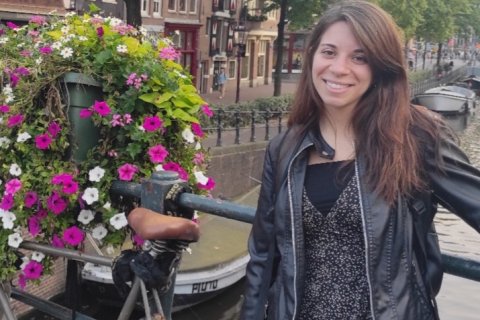Beyond plans and pandemics
Former PhD student Foteini Stavropoulou

In 2020, right in the middle of the COVID-19 pandemic, I made the decision to move to the Netherlands to study Climate Physics for my master's degree. The truth is that the pandemic made this journey quite difficult. Being in a foreign country without the opportunity to engage with fellow students or teachers and studying the course mostly online was a real challenge. But in the end, everything worked out just fine.
My original plan was to become a physical oceanographer, a path shaped by growing up in Greece, a land of abundant sunshine, warmth, beautiful islands, and boundless water. But you know what they say about plans... little did I know that my journey would change course, leading me into the fascinating world of atmospheric chemistry and physics.
During my master's thesis, I had the amazing opportunity of working alongside Thomas Roeckmann and Daniel Zavala-Araiza. We investigated methane emissions from oil and gas infrastructure in Romania by analysing ground based CH4 measurements collected during the Romanian Methane Emissions from Oil & Gas (ROMEO) campaign. ROMEO brought together scientists from more than 14 international research institutes. We had our fair share of ups and downs along the way, but the outcome made it all worthwhile. Our results revealed that national inventories underestimate emissions by at least a factor of 2 and show a connection between detected emissions and operational venting in Romania's oil and gas production infrastructure. Unexpectedly, this is also encouraging, as it demonstrates massive potential for emissions mitigation. We ended up submitting a manuscript for publication with more than 50 (yes, you read that right, 50!) co-authors. My master's thesis also was nominated for the best Climate Physics master’s thesis of the year! But the cherry on the cake was catching the attention of the European Commission during this critical time of developing the EU Methane Regulations. This experience truly opened my eyes to the importance of reducing methane emissions and the actions that need to be taken, particularly from the energy sector, if we want to effectively limit near-term global warming.
After graduating, I wasn't sure whether pursuing a PhD was the right choice for me. So, I took my time to figure things out. In the meantime, I was lucky to be able to work as a Methane Research Analyst at Environmental Defence Fund (EDF), a global non-profit organization that addresses environmental challenges through science, economics, and policy. My role at EDF is to identify sources, magnitude, and impacts of methane emissions from the oil and gas sector. It's not just about numbers though: EDF also collaborates closely with other organizations, scientists, governments, industry leaders, and policymakers to come up with effective regulations and incentives to cut emissions of methane and other harmful gases.
Right now, I'm getting used to my growing responsibilities and expanding my knowledge regarding methane emissions while teaming up with a large group of international scientists from all over the world. However, these experiences are just the start of my career, and I'm very excited to see where the future takes me. I’ll keep you updated!
Foteini Stavropoulou

